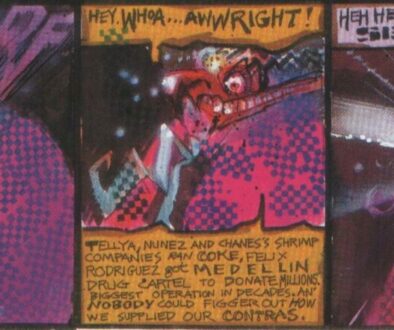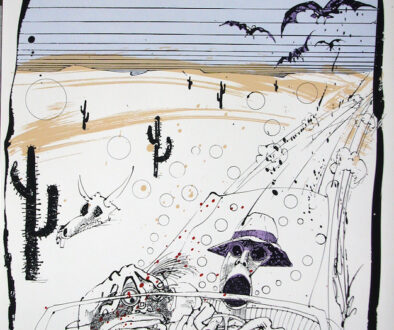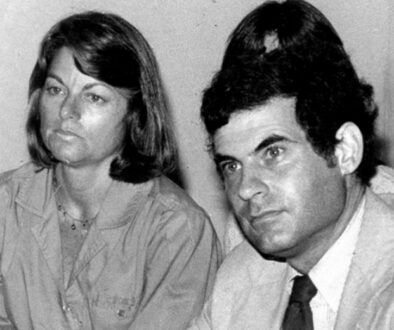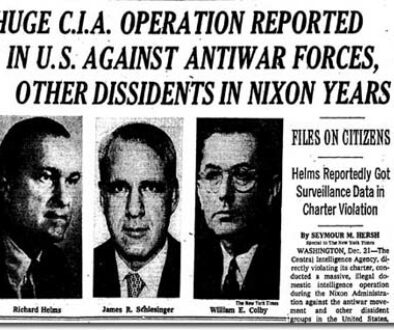The art cuts back to Evey for the final row of panels, her face in shadow, a single tear visible, the narration returning to her instead of simply her quoting Valerie. “I know every inch of this cell,” she thinks, as she holds the scrap of toilet paper up, her face shrunken and lined with wrinkles that should be impossible for a woman who is only sixteen years old, and kisses it softly on the x. “This cell knows every inch of me.” And a final panel, her eyes and nose, weathered, single tear still suspended on her face, the edges of it simply fading out to the stark and infinite whiteness of the page.
“Except one.”
 |
Figure 599: Evey retains her last inch, refusing
to sign a false confession. (Written by Alan Moore,
art by David Lloyd, in Warrior #26, 1985) |
“Valerie” is followed by “The Verdict,” the last chapter of V for Vendetta to be published in Warrior. The chapter opens with Evey being offered the opportunity to confess to her “crimes” – that she was kidnapped by V, “systematically brainwashed by means of drugs and torture” and “frequently subjected to sexual abuse,” and that she aided him in “the unlawful killings of Roger Dascombe, Mr. Derek Almond, Dr. Della Surridge, and the Reverend Antony Lilliman, Bishop of Westminster,” and that “the above statement is genuine, and that it was not signed by means of intimidation.” This last statement is rather clearly untrue, however, as when she declines to send it she’s told that she’ll be taken “out behind the chemical sheds” and shot.
 |
Figure 600: The final page of V for Vendetta
to appear in Warrior. (Written by Alan Moore,
art by David Lloyd, from “The Verdict” in Warrior
#26, 1985) |
And so Evey returns to her cell and reads Valerie’s letter again, waiting for Rossiter to come and take her to her execution. She’s given one last chance to sign the statement. “You could be out in three years. Perhaps they’d find you a job with the finger,” she’s told, but she declines once again, saying, “thank you, but I’d rather die behind the chemical sheds.” And so her guard proclaims that “there’s nothing left to threaten with” and tells her that she’s free. Shocked, she turns around and sees that her cell door is open and unguarded. She stumbles out through the compound, realizing that all the soldiers and guards are just dummies and tape recorders. Finally, she pushes through a door and comes into the main room of the Shadow Gallery, where V stands waiting for her, saying simply, “welcome home.”
 |
Figure 601: After a three year delay, Evey finally
reacts to the cliffhanger of “The Verdict.” (Written
by Alan Moore, art by David Lloyd, from “Values” in
V for Vendetta #7, 1988) |
Part Two of V for Vendetta ultimately had two further chapters, both of which saw first publication in DC Comics’ V for Vendetta #7 in 1988, although the first of them, “Values,” was written and drawn for the never-published Warrior #27. It continues the exclusive focus on Evey, resolving the rather striking cliffhanger on which the series was hung for nearly four years. It starts with a close-up of Evey, shocked by the revelation, as she breaks down sobbing that “yuh-you hit me, and, and you cut off my hair… it was you. It was just you all this time… you… tortured… me… oh, you tortured me… oh god, why?”
 |
Figure 602: Evey’s ascension. (Written by Alan Moore, art by David Lloyd,
from “Values” in V for Vendetta #7, 1988) |
To this, V replies simply, “Because I love you. Because I want to set you free.” As Evey erupts in horror at this claim, sputtering, “you say you want to set me free and you put me in a prison,” he explains that “you were already in a prison. You’ve been in a prison all your life… happiness is the most insidious prison of all.” He continues telling her how she’s free now, while she grows increasingly frantic and panicked. “Woman, this is the most important moment of your life,” he tells her, “don’t run from it” as she doubles over, saying that she can’t breathe. “You were in a cell, Evey,” tells her. “They offered you a choice between the death of your principles and the death of your body. You said you’d rather die. You faced the fear of your own death, and you were calm and still. Try to feel now what you felt then,” V tells her, while she lies in his arms, saying “Oh, Oh, I can feel it… oh what is it… oh, I’m going to die, I’m going to burst… I… uh… oh God… I felt… huhh… I… felt… like… an angel.” Finally he takes her out onto the roof, where she stands nude in the rain. “V…” she says. “Everything’s so… different. I… I feel so…,” and V reassures her, “I know. Five years ago, I too came through a night like this, naked under a roaring sky. This night is yours. Seize it. Enricle it within your arms. Bury it in your heart up to the hilt. Become transfixed. Become transfigured. Forever.”
This, as the final chapter of Part Two renders explicit, serves as Evey’s initiation – the point at which she comes to fully embrace V’s anarchist ideology. (In it, V also explains what attentive readers would have figured out in the “Valerie” chapter, namely that Valerie was the woman one door down from V in Larkhill.) But more to the point, it is the first time Moore has written a magical initiation into one of his comics, although he was still years off from actually having the aesthetic and philosophical framework to consciously craft it as such. Nevertheless, the overall structure is visibly that of the descent into the abyss, confrontation with ego-death/Choronzon, and subsequent rebirth. It is also worth noting that this is clearly the most important sequence in V for Vendetta, at least in terms of emphasis. Fully five straight chapters are devoted to Evey’s experience in prison, starting with the dream sequence of “Vicissitudes” and ending with her rain-soaked transfiguration. One could even argue six chapters by counting “Vengeance,” which, as an all-Evey chapter, is not an unreasonable claim either. In comparison, the entire arc from Evey offering to help V to the end of Part One is only six chapters, and contains sequences featuring at least eight different characters. Nowhere else in V for Vendetta is there anything nearly as long and singularly focused as V’s extended manipulation and psychological warfare against Evey. Its thirty-six pages form nearly fifteen percent of the total narrative.
 |
Figure 603: Evey, after the destruction
of her whole personality at the hands
of V. (Written by Alan Moore, art by David
Lloyd, from “Vignettes” in V for Vendetta
#7, 1988) |
And yet, strikingly, there is no moral debate anywhere within V for Vendetta about V’s kidnapping and torturing Evey. This is striking, given that the moral debate over killing is ultimately what Moore would opt to focus the story’s climax on, and yet none of V’s murders are as unsettling as his treatment of Evey. The fact that the reader is shown Evey’s treatment sincerely, as though all is as it appears is tremendously affecting, especially when one recalls that the comic was being serialized monthly, such that the amount of time the reader spends genuinely believing Evey is in a fascist prison undergoing the sort of authoritarian interrogations for which the adjective “Kafka-esque” was coined is not merely twenty pages but the better part of four months. And this is clearly a concept that does genuinely disturb Moore, because he was already planning Liz Tremayne’s storyline in Swamp Thing, which he described in terms that could equally well apply to what V does to Evey: “the destruction of one human being’s whole personality by another.” When talking about it in terms of Swamp Thing, he called it “an example of human evil that, to me, is more frightening than any number of demons from hell.” So the basic horror of what happens to Evey is such that the revelation that it’s all for Evey’s own good and her subsequent thanking of V “for what you’ve done for me” is not really enough to counterbalanace it.
But equally, that’s the point. It’s unfair to suggest that Moore gives V a moral pass on this. But it is nevertheless the case that while the narrative eventually sides against V on the issue of killing, it never really does on the issue of torturing someone at length to convert them to your ideological position. It may be unsettling, but it comes closer to being praised than condemned. It is easy to make too much of this – Moore, in several interviews, says something to the effect of “although the artwork was very black-and-white, with no shades of gray, I thought that one of the most interesting things about the strip was that morally there was nothing but gray.” Surely the torture of Evey is the ultimate example of this. But equally, there is something revealing in the fact that this is not one of the issues Moore chooses to move out of the realm of ambiguity in the story’s resolution. Ultimately, one suspects that Moore is not entirely willing to commit to the idea that the searing radiance of spiritual enlightenment need be consensual. Certainly this position is compatible with V for Vendetta as a whole. The story may not go to the theatrical extremes that V does within it, but its overall purpose is clearly to unsettle the reader’s assumed beliefs about the world and to get them to seriously consider anarchist revolution as a solution to their ills. And it is worth highlighting the word “theatrical,” as ultimately, that’s what V’s psychological assault on Evey, from the moment he exiles her to the end of Book Two, is: an act of elaborate theater. At the end of the day, Moore is clearly in favor of using art to terrorize people into spiritual enlightenment.
 |
Figure 604: The title page to Blake’s unfinished
The French Revolution. |
Blake, of course, was much the same. Floundering in the early stages of his career, and roiling with his visionary, revolutionary politics, Blake felt the noose tightening in more ways than one. The aftermath of the French Revolution led to a crackdown on dissidents in England – a 1792 Royal Proclamation specifically condemned “seditious writings.” Blake, in this time, was open about his politics, composing but never publishing the first part of what was intended to be a seven book poem about the Revolution. But in time Blake’s outward vigor dimmed. It was not that he lacked courage – quite the contrary, he boldly printed America a Prophecy under his own name. And yet the same year, he (quite wrongly) predicted that he would not survive five more years, and speculated “if I live one it will be a Wonder.” But Blake was always particularly terrified of being persecuted for his beliefs, both political and religious, and this combined with his revulsion as Revolution gave way to Terror. Modifying the printing techniques he’d developed for The Marriage of Heaven and Hell and Songs of Innocence, Blake began composing his Continental Prophecies, which were at once more radical and more cryptic than The French Revolution.
This esotericism had an unsettling yet compelling effect. Freed of merely crafting commentary on existing events, Blake’s mythic reworkings of history and revolution provided something more like an idealized form of revolution – one that reached beyond the immediate circumstances of his time and instead got at the very heart of social and political change. Blake was no longer writing anything so trite as allegory. The word he chose was terrifying in its boldness: prophecy. Blake is not describing history, but the shape and way in which the world will and might and can change. This is not art about persuasion, or political commentary, but about revelation – about revealing the shape of the end of the world.
And yet the turn from explicit political commentary to something more shrouded and occult is carried over in the works themselves. Neither his mythic reworking of the American Revolution nor its sequel, Europe a Prophecy, tell stories of revolutions that fix the world, or even necessarily improve it. Instead they simply serve as another turn through Blake’s increasingly complex mythology – indeed, the same year that Europe a Prophecy saw print, Blake also put out The Book of Urizen, the start of a completely different cycle of books. Just as the American Revolution falls short because, ultimately, Orc is an inadequate figure, the French Revolution as depicted in Europe a Prophecy turns gradually rotten as the book unfolds.
 |
Figure 605: Title page to Blake’s Europe
a Prophecy (Copy K, Object 2, written
1794, printed 1821) |
The central character of Europe a Prophecy is Enitharmon, who makes her first substantive appearance within Blake’s system here, having been mentioned in passing in America a Prophecy. Over the alrger course of Blake’s mythology, Enitharmon is one of the most central female figures, serving as the counterpart to Los/Urthona, the creative urge and the closest thing Blake’s mythos has to a protagonist. This is a complex role to play, not least because Blake’s vision of femininity is a complex and not always entirely pleasant thing. In this regard, it is also significant that Europe a Prophecy opens with a prelude that itself continues the prelude of America a Prophecy in narrating the story of Orc, this time talking about “the nameless shadowy female” who “rose from out the breast of Orc,” and who addresses Enitharmon. Blake would later develop the character of the shadowy female into a fallen form of Vala, the fearsome emanation of gentle Luvah (whose own fallen form is Orc), and she would come to play a key role in his mythology, particularly in The Four Zoas.
Vala opens Europe a Prophecy by railing against Enitharmon, asking her, “wilt thou bring forth other sons? To cause my name to vanish, that my place may not be found.” She speaks of how she, “sitting in fathomless abyss of my immortal shrine” looks up at heaven and the stars and seizes “their burning power” so she can “bring forth howling terrors, all devouring fiery kings. Devouring & devour’d roaming on dark and desolate mountains In forests of eternal death, shrieking in hollow trees.” [continued]












January 9, 2015 @ 8:30 am
Another work inspired, albeit complicatedly, by the French Revolution was William Godwin's 1793 Enquiry Concerning Political Justice. Godwin — best known today as the husband of feminist pioneer Mary Wollstonecraft, father of sf pioneer Mary Shelley, and father-in-law of Percy Shelley — is often described as the founder of modern anarchism. The specific inspiration for the Enquiry was Thomas Paine's argument in Rights of Man that social order is primarily the result of voluntary interaction rather than government. Godwin actually met Wollstonecraft at a dinner party to celebrate Paine and his book, though they(G & W) didn't initially get on. Blake of course had connections to all of the above people, and illustrated one of Wollstonecraft's books. Both Godwin and Wollstonecraft defended the principles of the French Revolution while decrying the violence with which it was carried out. One American fan of both Godwin and Wollstonecraft (he actually carried Wollstonecraft's picture in a locket, and raised his daughter according to Wollstonecraftian principles) was Aaron Burr.
January 9, 2015 @ 8:39 am
Some related trivia: Godwin (like his wife and daughter) was also a novelist. His two best novels are Caleb Williams, which gives a political twist to the problem of other minds, and St.-Léon, an sf/fantasy work about a man who discovers the secrets — and pragmatic downsides — of both eternal youth and turning lead into gold. Byron was a fan of these early novels and asked why Godwin's later novels weren't as good. Godwin replied that writing his early novels had drained him of energy, and it would kill him to write another like them — to which Byron answered "so what, if we could have another St.-Léon?" (a response Godwin could hardly resent, given his own severely utilitarian views).
I've written about Godwin's Caleb Williams here and his philosophy here.
January 9, 2015 @ 9:04 am
As long as I'm in Godwin-Wollstonecraft trivia mode: when Burke's Reflections on the Revolution in France came out, attacking not only the French Revolution but the very notion of human rights not based on tradition and social authority, many of the leading lights of British liberalism rushed into print to answer him. The most famous answer was Paine's, but the first answer to be published was Wollstonecraft's. Her book was Vindication of the Rights of Men, its title prefiguring her later and more famous Vindication of the Rights of Woman (the switch from plural to singular supposedly being inspired by Paine).
It's often forgotten that Malthus's Essay on the Principle of Population was originally a hostile response to Godwin's Enquiry.
January 9, 2015 @ 9:53 am
Ultimately, one suspects that Moore is not entirely willing to commit to the idea that the searing radiance of spiritual enlightenment need be consensual.
"Thou shalt not dose thy neighbor without his/her consent." — Timothy Leary
"Skinny-dipping in the waters of the paranormal can be CREEPY…" — Rev. Ivan Stang
January 9, 2015 @ 5:57 pm
You will not be surprised to learn that more than one of these names will come up before this chapter is done.
January 10, 2015 @ 1:24 am
January 10, 2015 @ 6:41 pm
I unashamedly love Wollstonecraft. She needs to be known more.
January 11, 2015 @ 7:59 am
I always thought that this was answered very interestingly (if bleakly) in the Babylon 5 episode, "Intersections in Real Time". Sheridan is put through horrible torture, is driven to the point where they tell him he either confesses or they kill him, and like Evey, he answers that he'd rather die. They acknowledge that they have no hold over him after that…and then wheel him into another room to start the exact same routine of torture at step one, showing that even death is not an escape for him. That it will continue forever until he breaks, or until he kills himself. They refuse even to give him the satisfaction of murdering him.
JMS has indicated he wasn't inspired by V, but there seem to be strong parallels. Anyone else have any thoughts?
January 11, 2015 @ 8:27 am
I didn't think of that, probably because I try not to think about "Intersections in Real Time" more than circumstances actually require me to. Now that you've opened the floodgates, however, I have plenty of thoughts.
"Intersections" is what TNG's "Chain of Command" wanted to be when it grew up. When I imagine it airing as the fourth season cliffhanger, the way JMS would have done if he'd known going into the fourth season that there would in fact be a fifth, "lab-quality freon drips into my veins" as Spider Robinson once put it. I have literally only ever been able to watch it right through, in a single sitting, once, the first time it aired on TNT. The only thing that made it bearable was the knowledge, through the network already being into season 5, that Sheridan would be freed, just as "Chain of Command, Part Two" was made bearable by the Status-Quo-is-God assumption that Picard would be freed by episode's end.
On the V comparison, the difference I see is that V was aiming for a mystical experience; the Earth Alliance was just aiming to get a false confession and inflict physical, mental and emotional pain, not necessarily in that order or even that priority.
November 1, 2015 @ 2:02 pm
“V was aiming for a mystical experience”
As I reread the blog with an eye to annotating my ePub copy with the figures and epigraphs, my brain elaborates on this. The EA, and Dennis, and Gul Madred, were only seeking to destroy their subjects’ personalities; at best, they were planning to rebuild them to exact specifications. V shaped Eve’s enlightenment* as much as he could, but he wasn’t foolish enough to think he could guide it exactly and still get something worth having. Ordering people to be free never really works.
(* Reference to Alice Miller’s “Evas Erwachen – Über die Auflösung emotionaler Blindheit”, published in English translation as “The Truth Will Set You Free: overcoming emotional blindness and finding your true self”. I don’t know if Alice Miller’s work was available in English when Moore was writing, but it picks up where Wilhelm Reich was forced to leave off.)
January 11, 2015 @ 8:33 pm
The (or a) common root for V, B5, and TNG here is the end of 1984.
January 15, 2015 @ 10:28 am
Such an extraordinary episode. Though it probably sounds like faint praise, it is easily the best thing Bruce Boxleitner has ever done. The absolute best part though was the revelation that the Drazi was working for the Alliance. That was an absolute gut-punch.
February 14, 2015 @ 6:08 am
This comment has been removed by the author.
February 14, 2015 @ 6:09 am
"This night is yours. Seize it. Enricle it within your arms. Bury it in your heart up to the hilt. Become transfixed. Become transfigured. Forever.”
After reading this scene for the first time I wept, utterly. Great to see Blake appearing again.